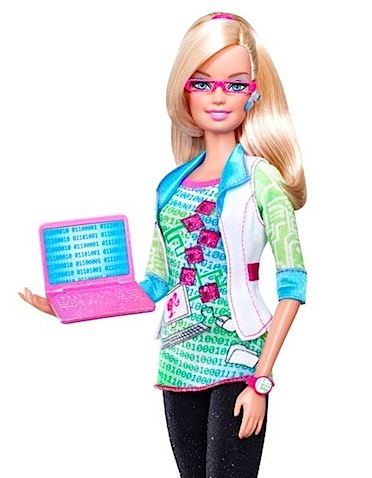Computer Engineer Barbie has always seemed profoundly wrong.
Not only is she a weird brand extension to begin with– pushing the envelope of what Mattel thinks is sexy — but I’ve always wondered how she could even see the keyboard of her laptop, given the overhang of her boobs. But I digress.

Now researchers have helped to put some dimension to my wariness about Computer Engineer Barbie.
Researchers Betz and Sekaquaptewa have found that…
Having a female science role model that is “girlie” — meaning, overtly feminine in a sexist way, not in a feminist way*, can actually discourage girls who are interested in STEM subjects.
These scientists found that, after being exposed to sexist, super-feminine images of women scientists, girls reported a “diminished interest” in pursuing STEM subjects, and lowered their belief in their scientific abilities. In so many ways, promoting femininity is not the same as promoting feminism.
What is Computer Barbie doing to these girls and their ambitions?
Opposing stereotypes can’t be combined
One answer is that the concept of conventional super-femininity is diametrically opposed to the stereotype of what it takes to be a smart, science competent woman, so that girls conclude that doing one cancels out the possibility of doing the other.
You simply can’t “be” both, in this universe.
Even NY’s Arbiter of Fashion Simon Doonan notes that super-smart women probably spent more time in the Lab than at Sephora, and might not have developed the same competency at fashion, make-up and style.
Obviously, y’all were too busy learning Python, correcting mistakes on Wikipedia, and testing the limits of Hadoop, to learn how to put on false eyelashes.
(I suspect that the super-fashionable, super-female, tech entrepreneurs I see in NYC are exceptions that prove the rule. They are super-fashionably feminine becuase many of their businesses are anchored in the fashion and lifestyle industries).
Either stereotype is unachievable
Another answer is that either one of these goals individually is virtually out of reach anyway (or so our current culture tells us).
Only a very few girls grow up to be super hot, and only a very few girls grow up to be scientifically competent. If either goal alone is so hard to achieve, how could a girl expect to grow up to be both of these?
You’ve got to be kidding. This is even more difficult than becoming the next Steve Jobs (who, you will, note wore a fashion-free uniform of jeans and a mock turtleneck. Double standard, anyone?)
The Sexy Scientist Stereotype sucks
Who wants to be a sexy scientist tech geek math genius anyway?
Isn’t being smart and competent enough?
Who wants to look like Barbie with a pink computer, when she could look like Sheryl Sandberg running a company with a user base of XX million?
Conclusion? Girls aren’t stupid about science, or about stereotypes.
As Research Digest notes: “These new results suggest that role models that take on too many stereotypic beliefs at once can actually backfire.
“Young girls may see [the success of such role models] as particularly difficult to emulate,” the researchers said, “given their rigid stereotypes about gender and scientists.”
“Submitting STEM role models to Pygmalion-style feminine makeovers may do more harm than good.”
Action step: Promote a diversity of scientific women role models
We need a diversity of women role models, with the full array of self-determined gendered self-presentations.
We need to promote and celebrate scientifically, technically, mathematically competent women of all orientations, all colors, all shapes and all sizes, all manner of styles and fashions, and not some over-plumped sexist fantasy.
Image: Computer Engineer Barbie, Mattel
Betz, D., and Sekaquaptewa, D. (2012). My Fair Physicist? Feminine Math and Science Role Models Demotivate Young Girls. Social Psychological and Personality Science DOI: http://dx.doi.org/10.1177/1948550612440735
** Just so you know, feminists can be big fans of femininity– as long as the person projecting that femininity defines it her/himself, finds it liberating, and makes sure that her/his gendered-self-expression does not make fun of anyone elses. But promoting femininity — a set of gendered self-stylings — is not the same as promoting feminism, a political perspective
 I am an organizational consultant, change advocate, and organizational identity/reputation scholar with a PhD in leadership & organizations. I research, write about, and consult with organizations on the relationships between organizational identity, actions, and purpose. I teach Technology Management, part-time, at Stevens Institute of Technology.
My current research focuses on how social technologies in the workplace can drive organizational change, generate meaning, and catalyze purpose. See the
I am an organizational consultant, change advocate, and organizational identity/reputation scholar with a PhD in leadership & organizations. I research, write about, and consult with organizations on the relationships between organizational identity, actions, and purpose. I teach Technology Management, part-time, at Stevens Institute of Technology.
My current research focuses on how social technologies in the workplace can drive organizational change, generate meaning, and catalyze purpose. See the 
{ 1 comment }
I love this post. It’s so funny and obvious, yet it’s true. Do you have to wear a mini skirt to be a great female scientist? Hmm. NO! Keep up the good fight!
Comments on this entry are closed.